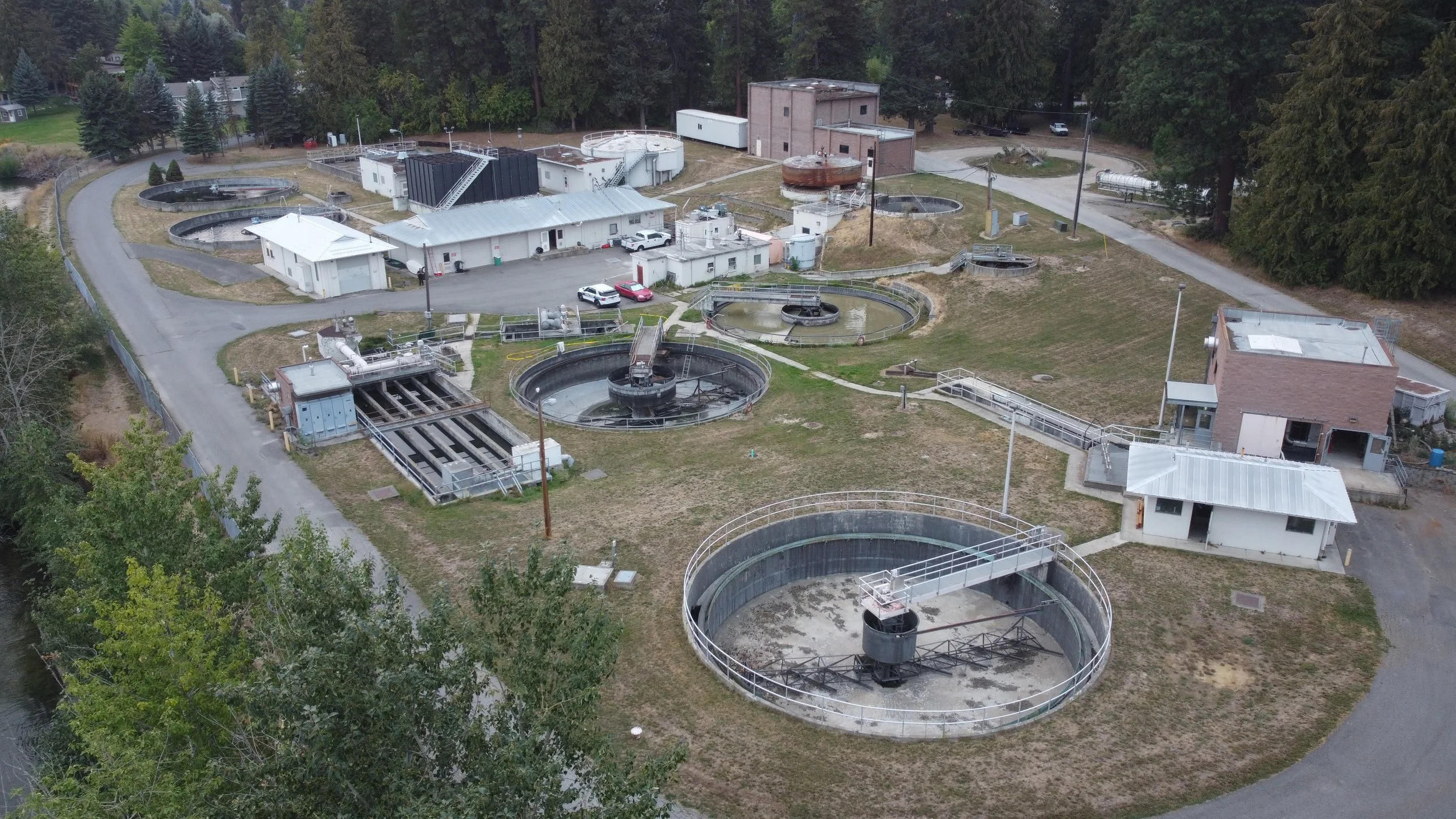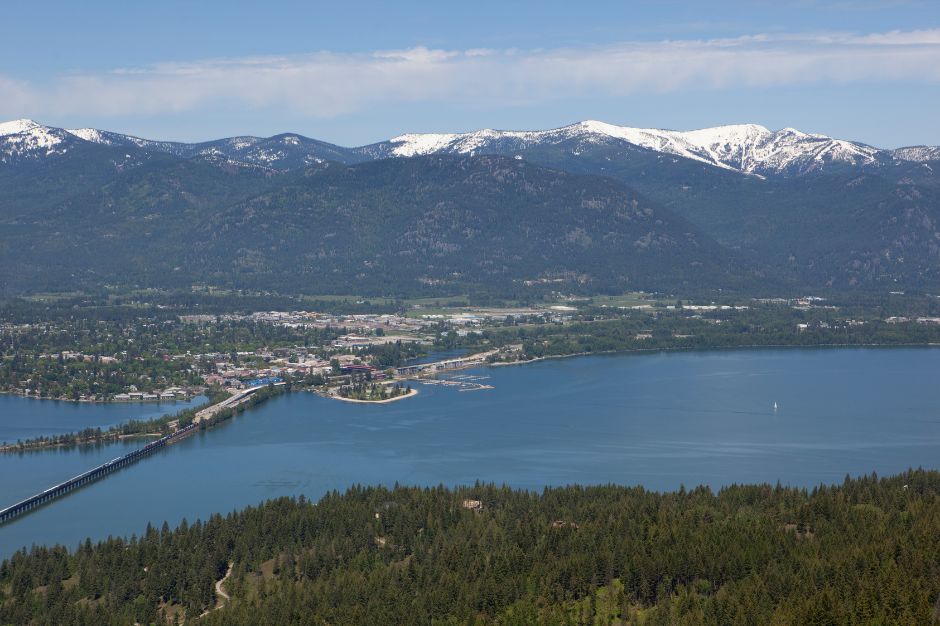
Investing in Clean Water, Protecting Our Future
A Message from Mayor Grimm
Neighbors,
The City of Sandpoint is planning for a major investment in our wastewater treatment plant. On November 4, 2025, voters will consider a bond measure that would give the City the authority to finance this project responsibly, in partnership with state and federal programs. Because this is such an important decision for our community, I want to share why the project is necessary and what it means for Sandpoint’s future.
Our community is at a turning point with our wastewater treatment plant. This is not a challenge that developed overnight, and it is not one that can be delayed much longer. For years, the system has been aging, and environmental requirements have continued to become more stringent.
At the center of this issue is clean water — something every one of us values. Lake Pend Oreille is part of our daily lives, whether we are swimming, boating, fishing, or simply trusting the water that comes from our taps. Protecting that resource is essential to our health, our economy, and our quality of life.
The plant must be rebuilt to continue meeting state and federal permits, prevent pollution, and protect the river and lake we depend on. While the cost is significant, delaying improvements carries greater risks, including higher costs over time, potential fines, and harm to the environment.
As a city, we are committed to making this process as responsible and transparent as possible. The November ballot measure gives Sandpoint the legal authority to seek outside funding and financing. This authority is what allows us to apply for low-interest loans, pursue federal and state grants, and issue only the amount needed to complete the project.
Protecting our water is a local responsibility and it is a regional and national priority. We will continue to pursue every available resource to support this project, while keeping the public fully informed as the work advances.
Thank you for engaging with this important issue and helping us protect Sandpoint’s future.
Jeremy Grimm
Mayor, City of Sandpoint
Why Now?
Much of Sandpoint’s wastewater treatment plant was built between the 1950s and 1980s and is at the end of its useful life. Key systems are prone to breakdown, making it harder to meet state and federal water quality permits. Delaying replacement risks costly fines, emergency repairs, and higher construction costs as prices continue to rise. Acting now ensures reliable service, protects the Pend Oreille River, and saves ratepayers money in the long run.
Aging Systems: Pumps, clarifiers, and electrical systems are at the end of their useful life and increasingly prone to breakdown.
Regulatory Compliance: State and federal permits require strict limits on pollutants such as ammonia, phosphorus, and bacteria. Meeting these requirements reliably will not be possible without upgrades.
Financial Prudence: Delaying construction means paying more later as inflation and material costs rise. In addition, the City could face significant daily fines for permit violations.
Lessons from Elsewhere: Cities that postponed similar projects faced spills, fines, and costly emergency repairs. Investing now prevents larger costs in the future.
What’s Planned?
The new wastewater treatment plant will replace outdated systems with modern, efficient technology. Improvements are designed to protect water quality, reduce energy use, and ensure reliable service for decades to come. Each upgrade will strengthen the City’s ability to meet permit standards, safeguard Lake Pend Oreille, and provide consistent service even during maintenance.
Headworks Improvements: New fine screens and grit removal equipment to protect pumps and reduce clogs.
Primary Treatment: Installation of primary filters to remove solids early, reducing stress on downstream processes and lowering energy use.
Biological Treatment: New aeration and mixing basins, paired with efficient blowers, to improve nutrient and ammonia removal.
Secondary Clarification: Modern clarifiers and safer access to pumps that return biology to the process, improving stability and water clarity.
Disinfection: Transition from chlorine disinfection to ultraviolet (UV), which eliminates bacteria without chemical storage risks.
Phosphorus Control: Chemical dosing to reduce phosphorus, protecting Lake Pend Oreille from algae blooms.
Electrical & Controls: Modern power systems and automated monitoring (SCADA) for faster response to issues and better reliability.
Redundancy: Systems designed so treatment continues even during maintenance or equipment replacement.
Funding Plan
Bond Authorization: Up to $130 million in revenue bonds (repaid from sewer revenues, not property taxes) to finance improvements.
Other Sources: The City will pursue low interest loans and grants, including Idaho DEQ State Revolving Fund ($38M low-interest loan + forgiveness), USDA Rural Development (long-term fixed financing), and EPA WIFIA (federal loan tied to Treasury rates).
Why Bond Authority is Needed: Most grants and loans require legal debt authorization before funds can be awarded. The bond ensures the City can accept outside funding and only issue the amount needed, up to the cap while improving our grant/loan competitiveness by proving readiness and match capacity.
Without Bond: If the measure fails, the project must still proceed, and while the City may pursue grants that don’t require debt authority, it would be primarily pay-as-you-go from sewer rates, which would force steeper and faster increases in order to accumulate sufficient funds to begin construction and repairs.
What a “Yes” or “No” Vote Means
Yes – Authorizes bond financing up to $130M, enabling the City to leverage outside loans and grants, phase responsibly, and spread costs over time. Rate increases are projected to be ~106% cumulative over five years, to allow the project to be financed with a long-term loan.
No – The project must still be built to comply with state and federal law. Without bond authority, costs are paid directly by ratepayers, resulting in ~600% cumulative increases within about five years.
Financial Information
The interest rate anticipated on the proposed bond issue is 4.27% per annum. The total amount estimated to be repaid over the life of the bonds, based on the anticipated interest rate, is $257,285,000, consisting of $130,000,000 in principal and $127,285,000 of interest. The term of the bonds will not exceed forty (40) years from the date of issuance. The estimated average annual cost to the taxpayer on the proposed bond is a tax of $0 per $100,000 of taxable assessed value, per year, based on current conditions. As of November 4, 2025, the total existing indebtedness of the City, including interest accrued, is $11,616,336.
Vote on the Wastewater Treatment Plant Bond on
November 4th, 2025
Community Benefits
Environmental Protection: Keeps harmful pollutants out of the Pend Oreille River.
Reliable Service: New systems with built-in redundancy reduce the risk of service outages.
Public Safety: Eliminates chlorine storage, updates electrical systems, and improves worker safety.
Economic Benefits: Supports local jobs during construction, reduces emergency repair costs, and helps avoid potential property value decline seen in communities affected by spills or algae blooms.
Long-Term Savings: Planned replacement is more cost-effective than repeated emergency repairs.
Get Involved
Learn more about our upcoming open house meetings and how to vote on election day.


